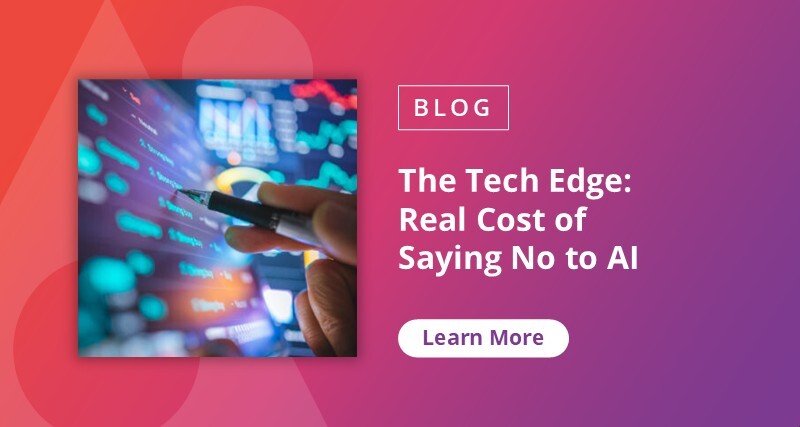For years, we’ve treated information like gold — something to hoard, mine, and guard as if it were a finite resource. But as AI continues to reshape our digital landscape, that mindset is no longer just outdated. It’s dangerous.
It’s always a good day when I get to chat with John Hodges, Chief Product Officer at AvePoint and this episode of The Tech Edge was no exception. Our conversation was eye-opening, and it’s clear that organizations must rethink their approach to data protection and information security in the AI era. Here’s what we uncover and why it matters.
Data Privacy Concerns Versus AI Innovation: A Delicate Balance
AI has dramatically altered the information protection landscape. It’s like “a massive rock thrown in a pond,” creating ripples and waves that organizations must now navigate. John paints a vivid picture with a relatable scenario: Imagine hiring someone to clean your house but feeling the need to “panic clean” before they arrive to hide your mess. That’s what it feels like when we introduce generative AI into our corporate environments. We instinctively worry about what the AI might uncover or expose our data practices.
This fear is valid. As John explains, bringing AI into a cluttered digital “house” filled with years of unorganized data – vendor assessments, product specs, legal contracts, and more – can be risky. Without proper safeguards, AI could reason over sensitive information, potentially violating privacy regulations like GDPR or crossing boundaries with customers. The solution? Data anonymization and de-identification. Before AI ever touches your data, it should be scrubbed and secured so that privacy remains intact while making room for innovation.
The Role of Consent and Responsibility in AI
The importance of user consent and shared responsibility is also a key focus in our conversation. As service providers, we have a duty to communicate clearly about how data is handled, what safeguards are in place, and how AI will be used. But consumers and individuals also bear responsibility. How often do we skim through terms and conditions or blindly consent to data collection without fully understanding the implications? John and I agree that transparency is non-negotiable. Service providers must make it easy for users to grasp what they’re agreeing to, while individuals must take ownership of their data and demand clarity.
As AI becomes an integral part of the business landscape, organizations must strike a balance between innovation and information protection. By treating data with the care it deserves, implementing robust security measures, and fostering transparency, businesses can harness the power of AI while maintaining the trust of their customers and users.
Why You Can’t Say No to AI
Here’s the reality check: You can’t opt out of AI. It’s already here, infiltrating every corner of our lives, from corporate boardrooms to the apps on our children’s phones. As John points out, even if your organization bans generative AI tools like Microsoft Copilot, Gemini, or ChatGPT, your employees are likely using them in their personal lives. The genie is out of the bottle, and it’s not going back in. The question isn’t whether to embrace AI; it’s how to prepare for it.
This preparation requires more than just purchasing AI licenses. It demands a holistic investment in security safeguards, data cleansing, and cultural change. Businesses must budget for the “fire doors” and “automatic closures” that protect sensitive information, ensuring that AI enhances rather than endangers our operations. Ignoring this reality is delusional. The era of AI is now, and organizations that fail to adapt will be left vulnerable.

Information Protection Strategies for Business Leaders
So, what should leaders do? Here are three critical steps to strengthen your organization’s information protection in the AI age:
- Adopt a Data Minimization Mindset
Audit your data stores and ask hard questions: Do we really need this? How long should we keep it? What risks does it pose if compromised? Develop clear policies for data retention and secure disposal, treating information like uranium — powerful but perilous.
- Prioritize Anonymization and Safeguards
Clean and anonymize your data before deploying AI. Implement robust information security measures to wall off sensitive information and ensure that AI innovations don’t come at the cost of privacy or compliance.
- Embrace AI with Eyes Wide Open
Acknowledge that AI is unavoidable. Invest in training, tools, and processes to integrate it responsibly. Maintain human oversight to catch biases or errors and foster a culture of trust and transparency with your customers and employees.
The Time Is Now
Cybersecurity has evolved from an IT necessity to a critical factor in business survival. As AI continues to evolve, so must our approach to data protection. We can’t afford to be reactive; we must be proactive. Resources like the Australian Cyber Security Centre, ENISA, and CISA offer valuable guidance, but the responsibility ultimately lies with each organization to act.
How organizations prepare for and manage this transition will determine their success in the AI era. By investing in robust information lifecycle management, security, and education, businesses can position themselves to thrive in this new landscape while protecting their most valuable asset – data.
The AI era is here, and it’s changing the game. Are you ready to protect your information?
Check out this episode and more here: The Tech Edge — Ticker.

